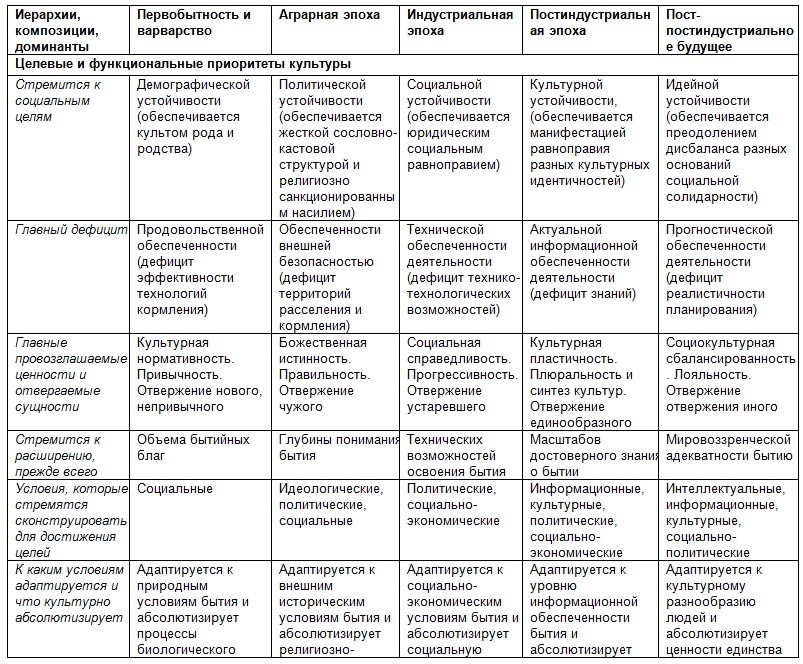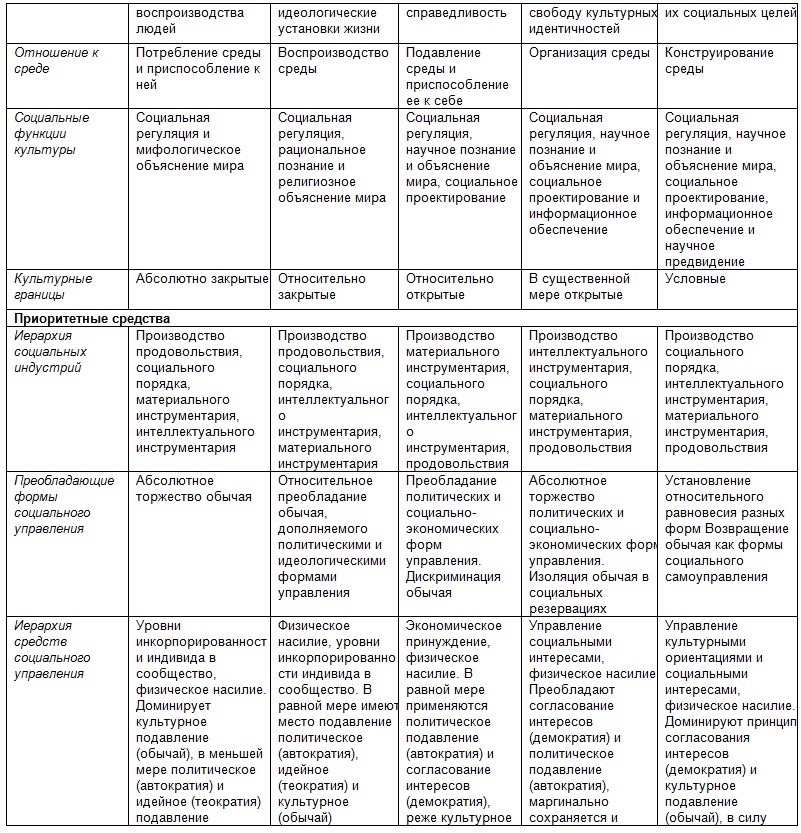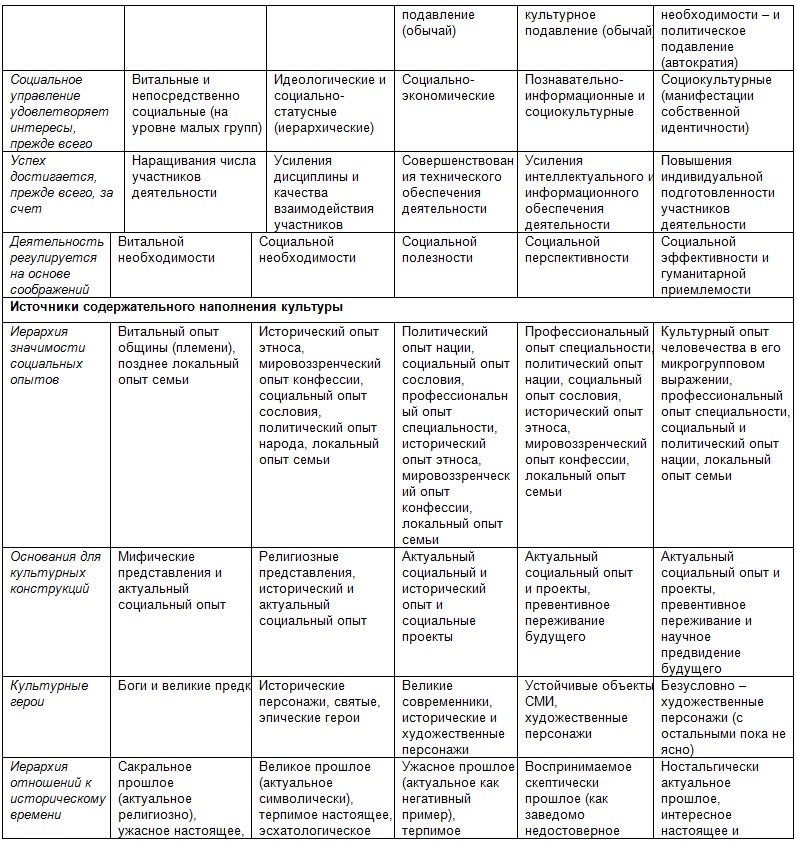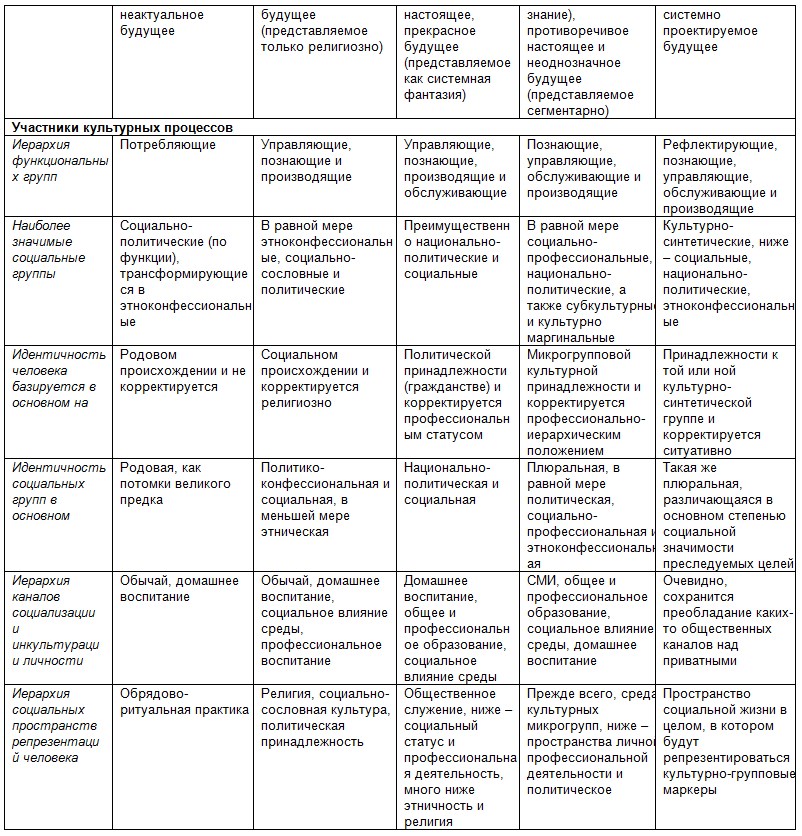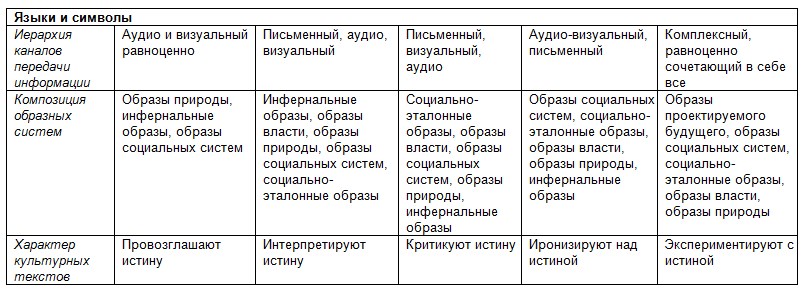НАУЧНО-ОБРАЗОВАТЕЛЬНОЕ КУЛЬТУРОЛОГИЧЕСКОЕ ОБЩЕСТВО
НАУЧНАЯ АССОЦИАЦИЯ ИССЛЕДОВАТЕЛЕЙ КУЛЬТУРЫ
Научное рецензируемое периодическое электронное издание
Выходит с 2014 г.

Гипотезы:
ТЕОРИЯ КУЛЬТУРЫ
Э.А. Орлова. Антропологические основания научного познания
Дискуссии:
В ПОИСКЕ СМЫСЛА ИСТОРИИ И КУЛЬТУРЫ (рубрика А.Я. Флиера)
А.В. Костина, А.Я. Флиер. Тернарная функциональная модель культуры (продолжение)
Н.А. Хренов. Русская культура рубежа XIX–XX вв.: гностический «ренессанс» в контексте символизма (продолжение)
В.М. Розин. Некоторые особенности современного искусства
В.И. Ионесов. Память вещи в образах и сюжетах культурной интроспекции
Аналитика:
КУЛЬТУРОЛОГИЧЕСКИЕ РАЗМЫШЛЕНИЯ
А.Я. Флиер. Социально-организационные функции культуры
М.И. Козьякова. Античный космос и его эволюция: ритуал, зрелище, развлечение
Н.А. Хренов. Спустя столетие: трагический опыт советской культуры (продолжение)


А.В. Костина, А.Я. Флиер
Куда история влечет культуру?
От «общества концертирующих» к «обществу репетирующих» [1]
(начало)
От автора
В течение четырех лет существования журнала я получил несколько писем от читателей, где они сообщают, что в некоторых моих работах встречают ссылки на мою совместную с А.В. Костиной статью «Куда история влечет культуру? От “общества концертирующих” к “обществу репетирующих”», но ни в одном журнале не могут найти ее текста. Потому они просят меня осуществить републикацию этой статьи в журнале «Культура культуры». С удовольствием откликаюсь на эту просьбу.
Читая статью, следует учитывать, что она писалась 7 лет назад, и некоторые ее прогнозы (например, подъем неоконсерватизма), похоже, начинают сбываться, хотя еще трудно сказать, сколь фундаментальна эта тенденция. Статья была опубликована в совместной монографии: Костина А.В., Флиер А.Я. Культура: между рабством конъюнктуры, рабством обычая и рабством статуса. М.: Согласие, 2011.
А.Я. Флиер
Аннотация. В статье рассматривается историческая эволюция культуры, изменение ее системообразующих параметров и типологических характеристик от эпохи к эпохе, по периодам исторического развития. Выделяются основные фундаментальные закономерности, определяющие вектор развития культуры и главные тенденции ее исторической эволюции.
Ключевые слова. Культура, история, общество, вектор эволюции, тенденции развития, закономерности культурной изменчивости.
Предсказания будущего – это малопочтенное занятие. Когда-то это делалось на основе благих пожеланий предсказателя, его мистических видений (пришедших в виде Божественных откровений или как-либо еще) или было откровенным обманом, осуществлявшимся с какой-то прагматически актуальной целью. Но даже при самых честных намерениях предсказателя, в его предсказаниях трудно было уловить какую-либо аналитическую основу. Это было скорее идеологически ангажированной мечтой (например, ренессансные утопии).
Со временем ситуация исправилась. Выработался более или менее универсальный метод предвидения будущего на основе анализа наблюдаемых тенденций развития и умозрительного продления их во времени. Правда, при этом обычно не учитывался (или не мог быть учтен) научно-технический прогресс, переход на иные источники энергии, иное инструментальное обеспечение жизни, что порождало такие курьезные прогнозы, как то, что к середине ХХ века Лондон утонет в конском навозе (по причине стремительного роста населения и расширения хозяйственной жизни города). Сейчас ученые-футурологи стремятся учесть все и даже не очень просчитываемые пути прогресса. Предсказаны альтернативные источники энергии, средства транспорта и технического обеспечения жизни. Все это как-то логически просчитывается на основе анализа современных трендов.
Стоит обратить внимание на очень важную составляющую современного общественного сознания – на культурную тенденцию превентивного переживания будущего, родившуюся еще в XIX веке (для нас наиболее известна марксистская теория коммунизма), но получившую особое развитие именно в ХХ столетии. Именно для ХХ века превентивность переживания будущего стала наиболее характерной стратегией переживания реальности, что выразилось в необъятном потоке научной и ненаучной фантастики (в любых видах искусства – литературе, кино, театре и т.п. и любых жанрах вплоть до комиксов и бытовых анекдотов, от блаженных утопий до политических антиутопий) и футурологических предсказаниях-мечтах ведущих ученых, философов и деятелей искусства, иногда политиков и др. Наконец, это воплотилось в институционализации целого научного направления – социальной футурологии, особенно развившейся и ставшей оказывать прямое воздействие на общественное сознание со времени появления доктрин Даниэла Белла о постиндустриальном обществе [2], Маршалла Маклюэна об обществе информационном [3] и Элвина Тоффлера о шоке будущего [4].
Складывается впечатление, что современное культурное сознание черпает социальный опыт уже не столько в анализе прошлого человечества и вытекающих из него уроков (большая часть этого опыта, к сожалению, уже безнадежно потеряла всякую социальную актуальность и применимость), а именно в превентивном переживании будущего. Если вчера мы обретали опыт, анализируя уже сыгранный концерт (поскольку следующий не должен был серьезно отличаться от состоявшегося), то сегодня стремимся к получению опыта в процессе репетирования концерта, еще предстоящего и принципиально не похожего на уже сыгранный. Из «общества концертирующих» мы превращается в «общество репетирующих», живущих телесно еще в настоящем, а интеллектуально и особенно эмоционально – уже в грядущем.
Науке еще предстоит определить, до какой степени современная культура посвящена этой «репетиции» завтрашнего дня (это можно сравнить и с военными маневрами, также репетирующими «завтрашнюю войну»), какие материальные и интеллектуальные ресурсы вовлечены в эти «репетиции». Но в отличие от военных, отдающих себе ясный отчет в том, что маневры – это только игра, для ученых и политиков, публицистов и писателей (и иных деятелей художественной культуры) интеллектуальная позиция «быть на шаг впереди реальной жизни» – отнюдь не игра, а метод осуществления их профессиональной деятельности, видимо, уже доказавший свою достаточную утилитарную эффективность (иначе бы в это не вкладывалось столько средств). А уж успех художественной фантастики (во всех видах литературы и искусства) показывает, до какой степени эти «репетиции» востребованы современным общественным сознанием.
А вот как предсказать будущее самой культуры в ее основных характеристиках? Можно ли провести такого же рода анализ тенденций культурного развития на протяжении истории человечества (в меньшем масштабе это не представляется достаточным и научно корректным)? Выявить или уловить почти на интуитивном уровне (ибо культурные тенденции очень противоречивы даже при взгляде с самого большого удаления) какие-то направления и умозрительно продлить их еще на шаг, еще на эпоху? Можно ли превентивно «отрепетировать» будущую культуру и на основе какой партитуры?
Для этого, как представляется, нужно наметить определенные характеристики (группы характеристик), которые, во-первых, являются показательными для состояния культуры в ту или иную эпоху (идеологии, доминирующей не просто формально, но и в реальном общественном сознании, и определяемых ею «правил игры», по которым живет общество), и, во-вторых, меняются от эпохи к эпохе так, что можно выявить какие-то закономерности (направление движения) в этих изменениях.
В качестве таковых групп характеристик, мы полагаем, можно выделить:
• целевые и функциональные приоритеты культуры (к чему культура стремится и с чем борется, к расширению чего идет, какие внутренние условия старается искусственно сконструировать, какие внешние условия адаптирует в первую очередь и что абсолютизирует, какие социальные функции для культуры приоритетны, каково ее отношение к среде обитания, степень открытости внешних границ взаимодействия и т.п.);
• приоритетные средства, с помощью которых культура осуществляет свои цели (тип доминирующих социальных индустрий, методы управления и социальной регуляции и их иерархия, основания для осуществления социальной регуляции и условия достижения успеха и пр.);
• источники содержательного наполнения культуры (актуальность разных социальных опытов и их иерархия, идейные основания для культурных конструкций, главные ценности и объекты отторжения, эталонные культурные герои, особенности отношения к историческому времени);
• участников культурных процессов (наиболее значимые социальные группировки участников, иерархия функциональных групп, преобладающие основания индивидуальной и групповой идентичности, иерархии каналов социализации и пространств репрезентации личности);
• языки и символы (иерархии каналов передачи информации, композиции образных систем, характеристики культурных текстов и пр.).
В качестве эпох, на которые в данном исследовании будет делиться историческое время, мы выбрали уже общепринятые в современных общественных науках технологические эпохи – первобытную (включая ее позднюю «варварскую» стадию), аграрную (начиная со становления первых городских цивилизаций), индустриальную, постиндустриальную и ту, что последует в будущем после постиндустриальной, которую мы условно назвали «пост-постиндустриальной» (не берясь предсказывать технологию, которая станет основной в будущем, и потому, не пытаясь выдумать название для этой эпохи). Попыткой представить себе основные (преимущественно социально-функциональные) характеристики культуры грядущей пост-постиндустриальной эпохи на основании анализа направленности трендов предшествующих эпох и является данное исследование.
Прежде всего, мы сочли необходимым выстроить приведенную ниже таблицу сравнения эпохальных культур по выделенным характеристикам [5]:
Следует сразу оговориться, что предлагаемый нами прогноз базируется на некотором числе «если», благополучная реализация которых далеко не гарантирована человечеству. Мы думаем, что предполагаемое нами может осуществиться, если: а) человечество найдет способ эффективного преодоления ожидаемого энергетического кризиса, вызванного скорым исчерпанием запасов углеводородных источников энергии; б) нагрузка на природу в связи с расширяющейся технической экспансией человека не приведет к последствиям, создающим уже принципиально новые экологические условия обитания на Земле; в) «обратная демографическая колонизация» (массированная миграция азиатского и африканского населения в Европу и Америку) не нарушит серьезно существующей политической, социальной и в особенности культурной ситуации, органичной для Европы и Северной Америки; г) в Европе и Северной Америке в целом сохранятся политический строй и социальное устройство, ориентированные на либерально-демократические принципы, заложенные Просвещением; д) удастся сохранить мир и избегнуть масштабного военного столкновения между мирами технологического детерминизма и религиозного фундаментализма (в их любых конкретно-политических воплощениях), что даже при наиболее вероятной победе Запада обойдется ему в принципиально неприемлемую цену [6]. Если будут успешно преодолены перечисленные опасности (и наверняка еще многие, о которых мы даже не догадываемся), то развитие культуры в экономически развитых демократических странах (это еще не значит, что во всем мире) может пойти по предполагаемому нами пути.
Теперь попытаемся изложить логику нашего понимания рассматриваемой культурной динамики, проиллюстрированной приведенной таблицей.
Прежде всего, представляется необходимым определить функционально-целевые установки разных эпохальных культур (то, какой дефицит они преодолевали и к каким актуальным социальным целям стремились) и проследить внутреннюю логику динамики исторического развития этих установок.
Судя по всему, первобытная культура стремилась к обеспечению, в первую очередь, демографической устойчивости сообществ (условно говоря, в идеале пыталась обеспечить право на рождение и жизнь в возможных пределах для каждого человека). Эта цель поддерживалась особой значимостью режима репродуктивного поведения людей (и основные регулятивные установки культуры были сосредоточены на этом и на предотвращении конфликтов по этому поводу) и сакральным культом рода и родового прародителя (великого предка). Основным дефицитом были продукты питания, и социальная практика сообществ была сосредоточена, главным образом, на продовольственном обеспечении. А это, в свою очередь, было тесно связано с решением задачи обеспечения демографической устойчивости.
Аграрная эпоха, по нашему мнению, была сосредоточена на поддержании политической устойчивости сообществ (в конечном счете – борьбе за право на существование между всеми локальными сообществами). Фактически на протяжении всей эпохи имела место постоянная война всех со всеми за жизненные пространства (или контролируемые пространства), и только при условии достаточной обеспеченности жизненным пространством собственного сообщества право на такое же пространство признавалось и за другими. Разумеется, это не исчерпывало всего содержания истории эпохи. Особо значимую роль в это время играла религия, которая нередко становилась поводом и для обширных завоеваний. Но и религия в это время была полноценной политической доктриной (по своим социальным функциям даже в первую очередь политической доктриной) и обслуживала, прежде всего, ту же самую устойчивость политических сообществ. Понятно, что дефицитом, который сообщества стремились преодолеть в процессе соперничества, были доступные и удобные территории для расселения и кормления и уже во вторую очередь для распространения веры и осуществления власти.
Культура индустриальной эпохи в существенной мере посвятила себя борьбе за обеспечение социальной устойчивости сообществ (т.е. достижению социального равенства и равного доступа к благам всех людей; отсюда и такая любовь к социальным революциям, в идеале стремившихся к формальному равенству социальных возможностей для всех). Опыт предшествующей эпохи научил, что ситуация подавления одной из соперничающих социальных (политических, конфессиональных, этнических) группировок всех прочих не приводит к долговременной устойчивости. Устойчивость – это баланс интересов разных групп. И именно к такому балансу (в формах политической демократии), в конечном счете, стремилась культура эпохи. Основной дефицит возможностей, актуальный для этой эпохи, – недостаточная эффективность технико-технологического инструментария деятельности, на преодоление которого и были нацелены все научные и технические революции нового времени. Именно преодоление технико-технологической неэффективности производства вселяло надежду на возможность обеспечить всех равным доступом к социальным (и, прежде всего, материальным) благам. Коммунизм был возможен только в бездефицитной ситуации.
Культура постиндустриальной эпохи, еще находящая в процессе своего становления, развивается в сообществах, где равное право на доступ к социальным благам более или менее обеспечено. И постепенно обретает особую актуальность проблема достижения культурной устойчивости – т.е. равного права для всех индивидов и социальных групп на жизнь в режиме соответствия своей культурной идентичности (что стало особенно острым в условиях абсолютной полиэтничности и поликонфессиональности населения современных крупных городов). Но это проблема социального жизнеустройства. Одновременно, выйдя на определенную стадию научно-технического развития в своих производствах, экономически продвинутые сообщества стали ощущать острый дефицит знаний, более всего сдерживающий процессы развития. Борьба за преодоление этого дефицита, за построение экономики знания (т.е. информационной обеспеченности жизнедеятельности) стал основным императивом деятельности. Но рост информационной обеспеченности, в том числе, развивает и культурную толерантность людей. Так что и здесь взаимосвязь социальных целей и преодолеваемого дефицита совершенно очевидна.
Итак, от устойчивости демографической к устойчивости политической, затем социальной и, наконец, культурной… От преодоления дефицита продовольствия, к преодолению дефицита территории, затем дефицита технико-технологической обеспеченности деятельности, дефицита знаний и информационной обеспеченности… Что же будет дальше?
Если следовать логике прослеживаемых тенденций, то представляется, что следующей социальной целью культуры должно стать достижение идеологической устойчивости сообществ. Это не означает подавления всех одной единственно верной идеологией, а наоборот, достижения разумного баланса разных идеологий. При этом под идеологией следует понимать не политическую доктрину (по типу коммунистической или либеральной), а то или иное теоретическое основание для социальной солидарности людей (по кровному родству, общности происхождения, общности социальных или политических целей, общности языка и обычаев, общности веры и конфессиональной принадлежности, общности профессиональных интересов или идейных устремлений, эстетических предпочтений, увлечений, сексуальных ориентаций и пр.). Достижение действенного равноправия этих разных оснований социальной солидарности (не будем сейчас гадать, каким образом) и должно, по нашему мнению, привести к радикальному повышению идеологической устойчивости сообществ.
Дефицит, преодолеваемый на следующем этапе культурной истории, как нам кажется, будет связан с преодолением ограниченных прогностических возможностей существующих парадигм познания, с развитием технологий превращения приобретаемого знания о каких-то процессах в основание высоко вероятного по своей достоверности предвидения их дальнейшего развития. Возможно, речь пойдет о совершенствовании существующих методов просчета последствий действующих трендов в рамках применяемых алгоритмов, но, скорее всего, будут найдены какие-то иные, более надежные алгоритмы. Это будет в равной мере касаться политических, социальных, экономических, научных, культурных и иных процессов. По нашему мнению, уже невозможно эффективное управление процессами производства, познания и организации чего-то на существующем уровне точности трендовой прогностики.
Этими двумя базовыми параметрами в большой мере определяется и большинство иных характеристик, рассматриваемых в проблемной группе «целевые и функциональные приоритеты культуры». В частности показательна эволюция основных провозглашаемых ценностей и отвергаемых сущностей, а также вопрос о том, к расширению каких своих свойств и возможностей та или иная эпохальная культура стремится. Для первобытной культуры основная ценность – это культурная нормативность, отвергается новое (ненормативное), а стремится культура (в идеале) к расширению объема витальных благ для людей собственной общины. Аграрная культура провозглашает своей главной ценностью божественную истинность, отвергает чужое (по иному культурно закодированное) и стремится к расширению глубины понимания бытия (познанию истины). Для индустриальной культуры главные ценности – социальная справедливость и прогресс, предмет отторжения – устаревшее, потерявшее актуальность, а стремится она к всемерному расширению эффективности технического обеспечения деятельности. Постиндустриальная культура провозглашает главными ценностями культурную пластичность и плюральность, отвергает навязанное единообразие и стремится к расширению масштабов достоверного знания о бытии (не к уморительной истине, а к прагматически применимому знанию). В таком случае, как представляется, для пост-постиндустриальной культуры главными ценностями будут признаваться сбалансированность и взаимоуравновешенность разных (разноосновных и разнотипных) социокультурных объединений (на предыдущем этапе находившихся в хаотической соотнесенности друг с другом) и их лояльность по отношению друг к другу, отвергаться – культурное отвержение (т.е. нелояльность), а предметом расширения станет мировоззренческая адекватность человека его бытию (т.е. выстраивание на базе относительно высокой информационной обеспеченности качественно более точных и эффективных модельных представлений о бытии).
Те или иные целевые и функциональные приоритеты культуры в рамках своей направленности определяют и те или иные средства, с помощью которых цели достигаются. Прежде всего, это касается иерархии приоритетности так называемых «социальных индустрий», под которыми подразумеваются функциональные концентрации человеческих, материальных и интеллектуальных ресурсов на производстве той или иной особенно актуальной для сообщества продукции. В качестве основных видов такой продукции выделяются: а) продовольствие, б) технико-технологический инструментарий деятельности (собственно инструменты, вещи, сооружения и процедуры обмена ими, а также применяемые технологии производства всего этого), в) интеллектуальный инструментарий деятельности (знания, представления, верования, идеи, ценности, образы, тексты, содержащие в себе все это, и процедуры обмена и распространения их), г) социальный порядок (нормы и формы социальной организации, социального поведения и взаимодействия, технологии управления и поддержания порядка). Именами этих групп продукции и названы различные социальные индустрии.
Как показывают наши исследования, в разные эпохи иерархия социальной значимости разных социальных индустрий была разная. В первобытную эпоху эта иерархия была следующей: производство продовольствия, производство социального порядка, производство материального инструментария, производство интеллектуального инструментария. В аграрную эпоху, по нашему мнению, производство продовольствия и социального порядка остались на первых местах, а вот производство интеллектуального инструментария обошло по своей значимости производство инструментария материального (что нашло свое выражение в особой значимости религии). В индустриальную эпоху на первое место вышло производство материального инструментария (эпоха технико-технологического переоснащения материального производства и классических форм капитализма), затем уже шли социальный порядок, интеллектуальный инструментарий и откатившееся на последнее место продовольствие. В постиндустриальную эпоху с его гонкой за знанием и экономикой знания, естественно, на первое место вышло производство интеллектуального инструментария, а затем выстроились производства социального порядка, материального инструментария и продовольствия.
А дальше? Нам представляется, что на следующем этапе развития наиболее значимой социальной индустрией станет производство социального порядка – выход социального управления на качественно новый уровень, обеспечиваемый более эффективной прогностикой и обоснованностью планирования и программирования. Да и потребность в постоянном поддержании социально приемлемого баланса между различными (и разнокачественными) социальными объединениями с разными основаниями социальной солидарности, культурными идентичностями и пр. неизбежно выведет производство порядка на первое по значимости место среди других социальных индустрий. Далее, как представляется, выстроятся производства интеллектуального, материального инструментария и продовольствия.
Приоритетные формы и методы социального управления прошли свою специфическую историю. Под социальным управлением имеется в виду не только политическое насилие «сверху» (авторитарное подавление). Обычай – это тоже форма социального управления и подавления (культурного), теократия (не как политическое правление священников, а как ситуация особо значимых управленческих функций религии – и шире – любой идеологии – в обществе [7]) – идейное подавление.
В первобытной культуре имело место абсолютное торжество обычая. Управление преследовало цель систематизации порядков непосредственного жизнеобеспечения и социального взаимодействия и осуществлялось посредством регуляции уровней инкорпорированности индивида в сообщество (инициации и пр.) и физическим насилием. Доминировало культурное подавление (обычай), в меньшей мере политическое (автократия) и идейное (теократия).
Для аграрной культуры характерно, пожалуй, только относительное преобладание обычая как основной формы управления процедурами социального взаимодействия, дополняемого политическими и идеологическими формами. В качестве методов преобладало физическое насилие (по любому поводу) и в существенной мере – разные уровни инкорпорированности индивида в сообщество. Но в целом наблюдалось сравнительное равенство социальной значимости подавления политического (автократии), идейного (теократии) и культурного (обычая).
На индустриальной стадии развития культуры заметно преобладание политических и социально-экономических форм управления. Основные методы – экономическое принуждение (в форме добровольного найма) и физическое насилие (в отношении непослушных). В равной мере применяются политическое подавление (автократия) и согласование интересов (демократия), реже культурное подавление (обычай). О последнем можно сказать, что наблюдалась более или менее направленная дискриминация обычая и вытеснение его политическими формами управления.
Постиндустриальная стадия развития посвящена управлению обществом, прежде всего, посредством игры на социальных интересах людей и проявляет себя в абсолютном торжестве политических и социально-экономических форм управления. Преобладают согласование интересов (демократия) и политическое подавление (автократия, физическое насилие), маргинально сохраняется и культурное подавление (обычай). При этом происходит постепенная изоляция обычая в социальных резервациях (в более или менее закрытых религиозных и этнических микроструктурах).
Представляется, что пост-постиндустриальная стадия будет характерна «неоконсервативным ренессансом», который выразится, конечно же, не в возврате к каким-то прежним порядкам, а в постепенном возвращении обычая как формы актуального социального самоуправления, что будет обусловлено выравниванием значимости разных оснований социальной солидарности, как новационных, так и традиционных. Главным основанием для такого предположения служит представление о том, что нынешнее доминирование массовой культуры в существенной мере обусловлено чисто социальной ситуацией абсолютного преобладания мигрантов среди современного городского населения («местные» со стажем более, чем в два поколения предков, проживавших в этом городе, составляют незначительное меньшинство среди нынешних горожан). Точно так же и по этим же причинам за ХХ век радикально сократилось число носителей традиционной (в основном сельской) культуры.
Городское население оказывается, по преимуществу, маргинальным, оказавшимся в силу объективных причин оторванным и изолированным от материнской, корневой культуры. Но и носителями городской культуры – из-за временной локальности пребывания в новой культурной среде – эти индивиды не становятся. Пытаясь вписаться в социокультурные алгоритмы, которые выработаны новой для них средой, эти индивиды пытаются усвоить те смыслы и знаки, которые лежат на поверхности и которые связаны с инсценировками поведения, в том числе, речевого, визуальным обликом, алгоритмами жизнедеятельности (по крайней мере, в той их части, которая семиотически маркируется и подвергается социальной оценке). Усвоение этих стилей жизни (для тех, кто именно с городом связывает свою дальнейшую жизнедеятельность), в значительной мере, становится условием успешности функционирования этих индивидов в новом социокультурном контексте.
В то же время, наряду со стремлением усвоить эти смыслы новой для многих культурной среды, существенным становится и стремление сохранить в неизменности то содержание, которое является основополагающим для культурной идентичности данного индивида. А это – те образцы отношения с миром, которые были рождены корневой, традиционной культурой. На уровне функциональном такое рассогласование социальных и культурных приоритетов приводит к тому, что у человека развивается множественная идентичность, основанная и на обращении к традиционным образцам, и на выработке и/или принятии новых приоритетов, необходимых для формирования социального единства и поддержания социальной коммуникации. Это первая тенденция, связанная с сохранением и достаточно длительной активностью (если исходить из времени двух-трех поколей, необходимого для полной аккультурации и интеграции) тех смыслов, что задавались традицией.
Вторая выражается в том, что у новых горожан через несколько поколений должны начаться процессы выработки новой традиционной культуры, которую содержательно не может заменить массовая культура, создаваемая вне социальной среды ее потребителей и предложенная им в готовом виде. Представляется, что по-настоящему устойчивой может быть только культура, выработанная стихийно в результате социальных процессов, протекающих в среде самих потребителей [8].
Рано или поздно (и, думается, что достаточно скоро) в среде горожан начнут складываться стихийно вырабатывающиеся обычаи, которые начнут играть все более значимую роль в процессах самоуправления общества [9]. Появится новая традиционная культура – городская по месту происхождения и применения, но совершенно традиционная по своим социальным характеристикам (микроколлективистская по носителям и формам репрезентации, с особым – интерпретативным – типом новационности и пр. [10]), которая начнет работать на достижение нового относительного равновесия разных форм социального управления.
Содержательно новая культурная композиция будет посвящена управлению культурными ориентациями и социальными интересами людей, стимулированию их добровольной социальной адекватности и ответственности, хотя по необходимости будет применяться и физическое насилие [11]. Будет доминировать принцип согласования интересов (демократия), в каких-то пределах – политическое подавление (автократия) и все больше расти значимость обычая (культурного подавления).
(окончание в следующем номере)
ПРИМЕЧАНИЯ
[1] Авторы выражают сердечную признательность д.ф.н., проф. Г.В. Гриненко, своими критическими замечаниями помогшей в работе над этим прогнозом.
[2] Bell, Daniel. The Coming of Post-industrial Society: A Venture of Social Forecasting. N.Y.: Basic Books, 1973 (Белл Д. Грядущее постиндустриальное общество. М.: Академия, 1999. 640 с.).
[3] Mcluhan, Marshall. The Gutenberg Galaxy: The Making of Typographic Man. Toronto: University of Toronto Press, 1962 (Маклюэн М. Галактика Гуттенберга. Сотворение человека печатной культуры. Киев: Ника-Центр, 2003. 432 с.).
[4] Toffler, Alvin. Future Shock. N.Y.: Bantam Books, 1970 (Тоффлер Э. Футуршок. М.: Лань, 1997. 461 с.).
[5] Авторы прекрасно понимают, что и само разделение по эпохам, и выделенные характеристики, и содержательное наполнение разных характеристик являются высоко субъективными, отражающими только авторскую точку зрения. Но это метод. Пусть другие попробуют предложить свой вариант, и мы будем готовы согласиться с ним, если он окажется более обоснованным.
[6] Об этом см.: Eco, Umberto, A passo di gambero. Guerre calde e populismo mediatico. Milano: Bompiani, 2006 (Эко У. Полный назад! «Горячие войны» и популизм в СМИ. М.: Эксмо, 2007. 592 с.).
[7] В этом смысле СССР и Германия при нацистах были совершенно теократическими государствами.
[8] Вспомним, что западноевропейская культурная типология, принесенная в Россию реформами Петра Великого, стала устойчивой, только когда на ее базе выработалась уже собственно русская аристократическая культура с уже адаптированными западноевропейскими формами.
[9] По мнению некоторых исследователей, процесс становления «новой традиционности» уже начался. См.: Сурова Е.Э. Ритуальная повседневность и идентичность // Парадигма: Философско-культурологический альманах. Вып. 10. СПб.: СПбГУ, 2008. С. 131-141.
[10] О характеристиках традиционной культуры см. подробнее: Костина А.В. Национальная культура – этническая культура – массовая культура: «Баланс интересов» в современном обществе. М.: УРСС, 2009. 214 с.
[11] Представляется, что нынешнее резкое возобладание необходимости в физическом насилии как инструменте управления вызвано именно практически полным исчезновением (изоляцией) обычая как социальной регулятивной системы.
© А.В. Костина, А.Я. Флиер, 2018.
Статья поступила в редакцию 16 июня 2017 г.
Костина Анна Владимировна,
доктор философских наук, доктор культурологии, профессор,
декан факультета философии, культуры и искусства,
заведующая кафедрой философии, культурологии и политологии
Московского гуманитарного университета.
e-mail: anna_kostina@inbox.ru
Флиер Андрей Яковлевич,
доктор философских наук, профессор,
главный научный сотрудник
Российского НИИ культурного
и природного наследия им Д.С. Лихачева.
e-mail: andrey.flier@yandex.ru

ISSN 2311-3723
Учредитель:
ООО Издательство «Согласие»
Издатель:
Научная ассоциация
исследователей культуры
№ государственной
регистрации ЭЛ № ФС 77 – 56414 от 11.12.2013
Журнал индексируется:
Выходит 4 раза в год только в электронном виде
Номер готовили:
Главный редактор
А.Я. Флиер
Шеф-редактор
Т.В. Глазкова
Руководитель IT-центра
А.В. Лукьянов
Наш баннер:

Наш e-mail:
cultschool@gmail.com
НАШИ ПАРТНЁРЫ:
Мнение редакции может не совпадать с мнением авторов.
При полном или частичном использовании материалов ссылка на «Культуру культуры» обязательна.
© Научная ассоциация исследователей культуры, 2014-2024

